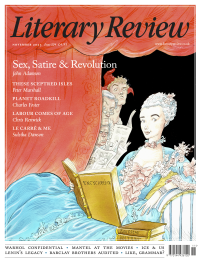Iain Bamforth
From Brandenburg to Brazil
Germany in the World: A Global History, 1500–2000
By David Blackbourn
Liveright 800pp £40
David Blackbourn’s impressive Germany in the World, with its admirable breadth of knowledge and clean prose style, expands his 1997 work The Long Nineteenth Century: A History of Germany, 1780–1918, which focused on the period when Germany underwent what he calls ‘a crash course in institutional modernization under French auspices’. This new book examines how Germans have been actors in the wider world of goods, ideas and populations over the last five hundred years, and how these dynamic forces have acted on them. It is a book ‘filled with commodities – from pepper, spices, diamonds, pearls, coffee, sugar, tobacco … through the “colonial goods” of the nineteenth century and the cornucopia of cars, washing machines, and the other advertisers’ dream products of the twentieth’. And, of course, with remarkable people, for although idealist philosophy has gained a not-undeserved reputation for somewhat nebulous abstractions, the German genius is characterised by its intensely practical nature. While figures like Holbein, Hartlib and Handel were making remarkable contributions to our island culture, nameless Germans were improving navigation with maps and globes, honing surgical devices and working as all kinds of small traders and weavers (the plain-weave fabrics exported across the world used to be known as ‘osnaburgs’, after the German city of Osnabrück).
The book starts off just before the Reformation, with the advent of Gutenberg’s movable type and the printing and rapid spread of religious materials in the vernacular. ‘Printing was the German art and it was Germans who introduced it almost everywhere,’ he writes. At the end of the

Sign Up to our newsletter
Receive free articles, highlights from the archive, news, details of prizes, and much more.@Lit_Review
Follow Literary Review on Twitter
Twitter Feed
'A charming and amusing personal history'
Don't miss this brilliant @Lit_Review review of #WorldCupFever 👇
@KuperSimon's must-read footballing journey in nine tournaments is out now ⚽️🏆
Michael Taylor - The Beautiful Game
Michael Taylor: The Beautiful Game - World Cup Fever: A Footballing Journey in Nine Tournaments by Simon Kuper; Th...
literaryreview.co.uk
In the summer of 1918, the Caspian port of Baku played host to a remarkable group of Allied soldiers, sent to defend oil wells against the Ottomans.
Anna Reid recounts their escapades.
Anna Reid - Mission Impossible
Anna Reid: Mission Impossible - Mavericks: Empire, Oil, Revolution and the Forgotten Battle of World War One by Nick Higham
literaryreview.co.uk
Alfred, Lord Tennyson is practically a byword for old-fashioned Victorian grandeur, rarely pictured without a cravat and a serious beard.
Seamus Perry tries to picture him as a younger man.
Seamus Perry - Before the Beard
Seamus Perry: Before the Beard - The Boundless Deep: Young Tennyson, Science, and the Crisis of Belief by Richard Holmes
literaryreview.co.uk